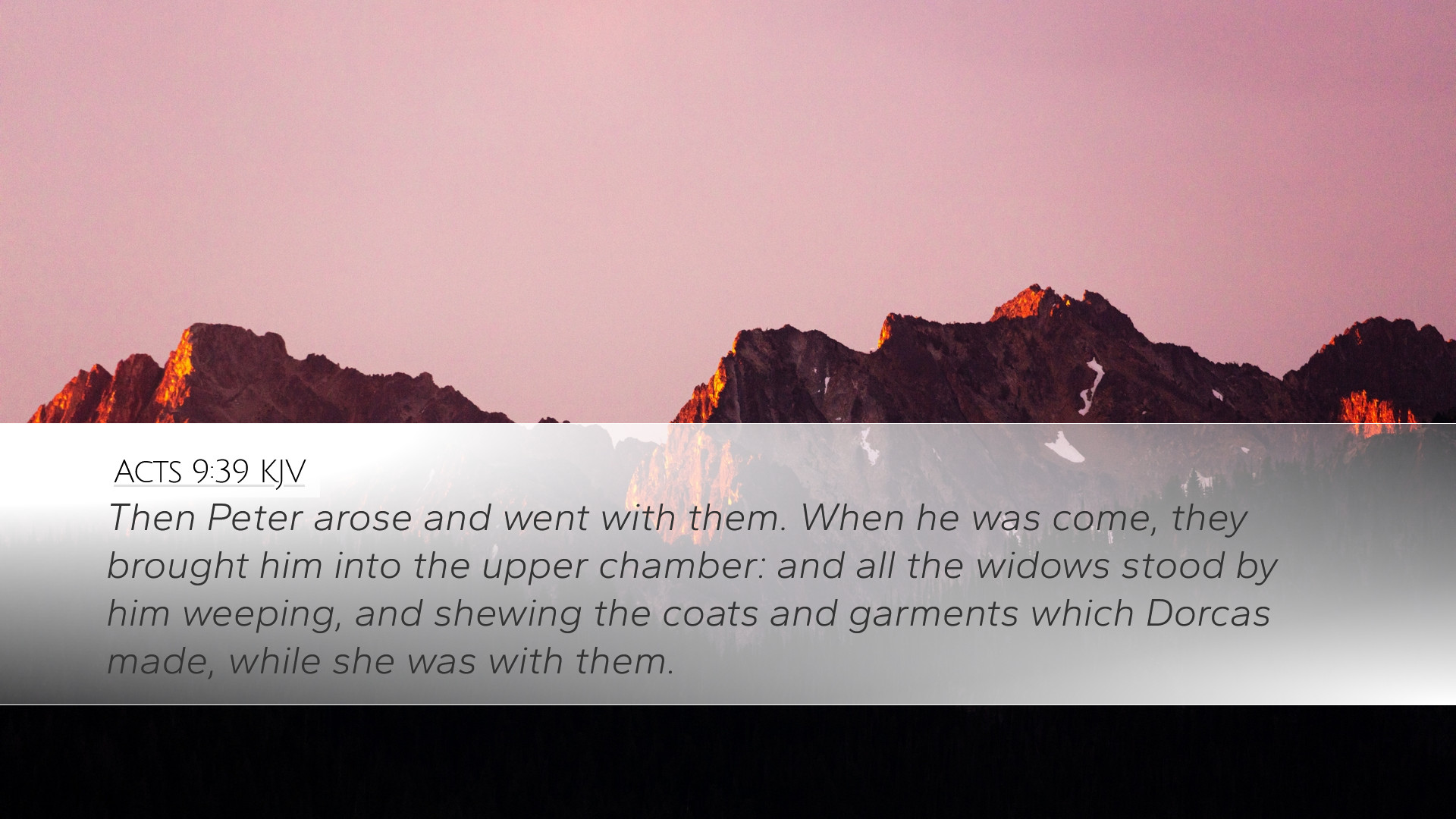Acts 9:39 - Commentary and Insights
Verse Reference: Acts 9:39 (NIV): "Peter went with them, and when he arrived he was taken upstairs to the room. All the widows stood around him, crying and showing him the robes and other clothing that Dorcas had made while she was still with them."
This verse occurs in the narrative of the miraculous raising of Tabitha (or Dorcas), a significant event illustrating both the compassion of the early Church and the power of God working through the Apostle Peter. The following commentary draws insights from various public domain sources, aiming to enrich the understanding of pastors, students, theologians, and Bible scholars.
Contextual Background
The events leading up to this verse occur in the broader context of early Christian miracles and the growth of the Church in the face of persecution. Tabitha/Dorcas is introduced as a disciple known for her good works and acts of charity. This is notable as it places emphasis on her character and contributions to the community.
Commentary Insights
1. The Significance of Dorcas
Matthew Henry's Commentary: Henry emphasizes the importance of Dorcas as a woman who devoted her life to service. He notes that her name, Tabitha in Aramaic and Dorcas in Greek, highlights her identity across cultures. Her good works are a testament to her faith, demonstrating that women played vital roles in the early Church.
2. The Role of Peter
Albert Barnes' Notes: Barnes provides valuable insights into Peter’s role in this miracle. He points out that Peter's willingness to go with the messengers reflects his pastoral heart and obedience to the Spirit. He underscores that God uses human instruments to perform His works, reinforcing Peter's authority and divine purpose.
3. Community Response
Adam Clarke's Commentary: Clarke notes the community’s reaction when Peter arrived. The widows, mourning for Dorcas, displayed the garments she had made for them. This act of presenting her works highlights her legacy and the profound impact she had on the lives of those around her. Clarke emphasizes that the tears of the widows signify a deep love and appreciation for Dorcas’s charity.
Theological Implications
This verse not only serves as a historical account but also provides crucial theological implications regarding the community life of the early Church and the role of miracles. The key themes include:
- Compassion in Community: The mention of widows underlines the Church's commitment to its most vulnerable members, emphasizing a theme of care and charity.
- Miracles as Testament: The raising of Dorcas stands as a testament to the power of God through faith, serving to strengthen the faith of the disciples and the community.
- Legacy of Service: Dorcas is remembered not for her piety alone but for her tangible acts of love, inviting believers to consider their own contributions to the body of Christ.
Exegesis of Key Elements
The Room (Upper Chamber): The upper room signifies a place of prayer and community gatherings. Its symbolic representation as a place of revelation and miracles is prevalent in Acts.
Crying and Showing Garments: This action reflects a deep-seated grief that is not just sentimental but also represents the community's recognition of the life and impact of Dorcas. It suggests that true faith is often visible through our actions towards others.
Application for Today
In reflecting on Acts 9:39, we can draw several practical applications for the modern Church:
- Value of Service: Every believer is called to serve, and the impact of one individual can resonate widely. Like Dorcas, our actions can manifest Christ's love to those around us.
- Community Involvement: This passage invites the Church to engage with the marginalized in society, highlighting the importance of compassion as a core element of faith.
- The Power of Prayer: The miracles in Acts often follow periods of prayer, emphasizing the need for the Church to remain diligent and united in prayer as it seeks God’s intervention in a broken world.
Conclusion
Acts 9:39 reveals profound truths about community, service, and divine power within the narrative of the early Church. The accounts of Dorcas’s life and her impact on the widows not only speak to the urgency of compassion within the body of Christ but also serve to encourage believers today to live out their faith through actionable love and support for one another.


